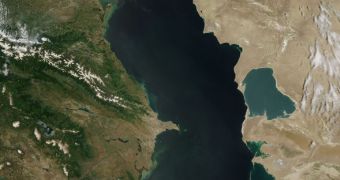According to the conclusions of a new study by researchers at the Massachusetts Institute of Technology and the Azerbaijan National Academy of Sciences, it would appear that the area around the Azerbaijani capital city of Baku is prone to producing a significant earthquake.
The country has a rich history of drama following tremors. Back in 1859, a massive tectonic event completely leveled the former capital city of Shemakha. The utter devastation is what caused the nation to change its capital in the first place. Baku is located on the shores of the Caspian Sea.
Over the past 150 years, the city has grown into a metropolis, primarily funded by vast offshore oil reserves. Numerous buildings were erected, and many people moved into the city. The new study shows that they are all in danger.
The investigators analyzed a decade of geological data, covering Baku and surrounding areas. They were able to determine that a huge buildup of tension is currently taking place around the city, which could be unleashed at any moment.
The geological deformation the group identified could cause significant loss of lives, damages ranging in the billions of dollars, and large oil spill. In fact, an earthquake hitting Baku will have repercussions throughout the Caspian Sea basin.
“It doesn’t take a gigantic earthquake. It just takes bad luck,” explains study team member Robert Reilinger, who was the principal research scientist on the study. He holds an appointment with the MIT Department of Earth, Atmospheric and Planetary Sciences (EAPS).
“And this is an area where they can’t afford it. It’s an extremely vulnerable area in terms of the density of the people, the density of oil infrastructure, and the potential environmental impact regionally, not just in Azerbaijan,” he goes on to say.
Details of how the new investigation was conducted appear in a paper published in the latest issue of the esteemed scientific Journal of Natural Hazards. The team says that, traditionally, earthquakes have struck along the boundaries of the Caucasus Mountains.
This mountain chain spans from the Black Sea to the Caspian Sea, and lies at the meeting point between the southern Arabian plate and the much larger Eurasian plate. Tension that builds as the plates grind against each other is occasionally released through earthquakes.

 14 DAY TRIAL //
14 DAY TRIAL //